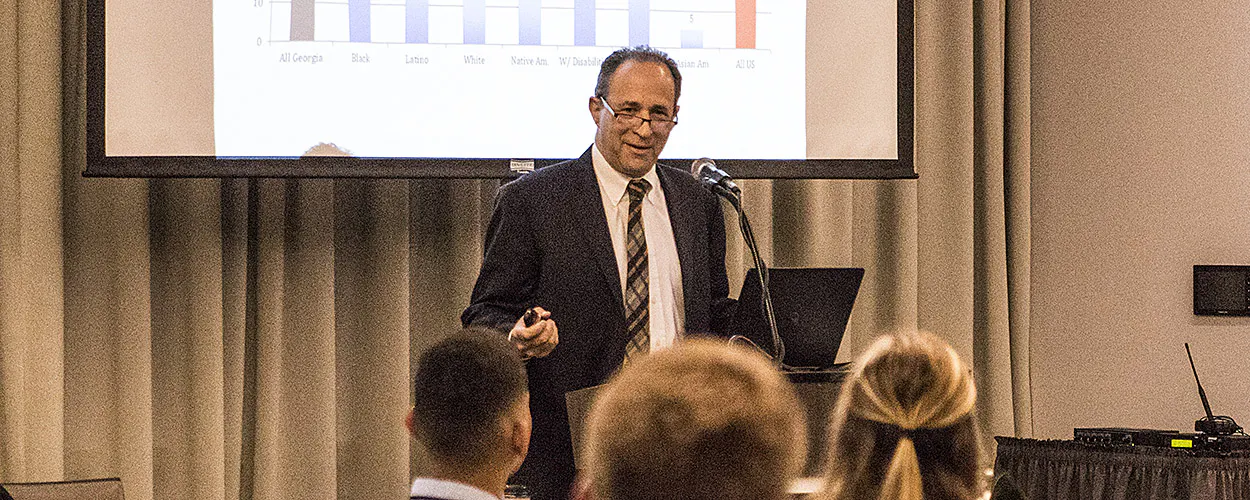When it comes to school discipline, out-of-school suspensions for misbehaving students is clearly not the solution, said the keynote speaker at last week's annual State of Education conference, hosted by the University of Georgia College of Education.
Out-of-school suspensions result in lost instructional time and are often counterproductive, said Daniel Losen, director of civil rights remedies at the University of California-Los Angeles' Civil Rights Project. According to his research, even missing just three days of instructional time translates to a drop of a full letter grade in a student's grade-point average. Also, students who experienced out-of-school suspensions were three times more likely to drop out of school, said Losen, who spoke to about 200 teachers, administrators, government leaders, parents and students at the 11th annual event.
This year's State of Education conference took place Sept. 21 at the UGA Center for Continuing Education and Hotel and focused on issues surrounding school discipline. Each year, the event focuses on an aspect of public schooling and reframes it with a Georgia perspective.
"The bottom line is, suspension is a very inefficient way to discipline when it's compared with graduation rates," said Losen. "The obvious impact of suspension is loss of instructional time, but we often don't think about discipline in terms of educational impact."
Georgia ranks 10th in the United States when comparing the amount of lost instructional time due to out-of-school suspensions, according to a 2016 study Losen cited of the most recent data available. While the national average is 23 lost days per 100 in-school days, Georgia averages 37 lost days. And when the numbers are further broken down between students' race, African-American children lose 77 days of instructional time, compared with 15 days for white children.
"So, yes, we have a problem," Losen said.
But what can be done to fix them? There's no one solution, Losen said, but there are tactics that show improvement in several areas. Looking at the numbers is a start, but it's a multi-faceted approach. It's also important to improve relationships between teachers and students, as well as improving trust and collaboration between teachers and parents.
A similar sentiment was expressed by Richard Welsh, an assistant professor at the UGA College of Education who spoke later in the day on new research he and a graduate student recently published looking at alternative approaches to student discipline. After reviewing more than 100 studies of methods from the past 20 years, they found positive outcomes from both PBIS (positive behavior interventions and supports) and restorative justice methods—although both had a long way to go in addressing racial disparities.
"The good news is, these programs are reducing rates (of discipline). But the gap between different student subgroups remains," said Welsh, who teaches in the College's educational administration and policy program. "We're just beginning to figure out what works, but we still have a lot of work to do."
Welsh noted one specific program researchers found that showed improvement in both the rates of discipline and racial disparities: The "My Teacher Project," a program that addressed implicit racial biases among teachers. By addressing the interpretation of a student's behavior at the source, both Welsh and Losen said, rates of disciplinary action were reduced across the board.
Implicit bias can alter our senses, Losen said, and that translates into how we respond to those around us.
"It affects what we pay attention to—if you're expecting bad behavior from one group over another, you're going to get it," he said. It also affects how we respond to behavior—we have to be aware of this."
While addressing behavioral issues at the classroom level can be influenced a lot by principals—and, Losen noted, principals who use out-of-school suspension as a last resort have been found to have higher student achievement rates overall—there are also actions school boards and other policymakers can take to support positive changes.
He recommended school boards and administrators examine behavioral policies to question whether they truly are "educationally sound," and to find alternative methods that can be achieved in a less discriminatory way. "The question isn't whether one group is misbehaving more than another, it's is the policy creating the issue?" he asked.
Georgia, for example, is one of 19 states that allows corporal punishment. And while the majority of schools don't subscribe to this form of punishment, there are those that do—and African-American children and children with disabilities are disproportionately affected by this policy.
School boards and administrators can also:
- Revise codes of conduct to remove punitive measures that aren't educationally sound
- Shorten suspension times
- Provide more counselors and support staff
- Dedicate resources to the implementation of less-punitive approaches
- Commit to addressing racial and disability disparities
- Change the behavioral approaches and expectations of teachers and administrators
- Monitor school climate and other data and adjust as necessary
Across the country, some school districts and even entire states have made shifts toward more positive solutions to behavior issues, he said. While there's no single solution—and in many cases, racial disparity is still an issue—the positives outweigh the negatives.
"But changing a law or a policy is just a start. There has to be buy-in by teachers and others," he said. "And at the end of the day it comes back to using your data—look at your data and don't be afraid to reject the status quo."
